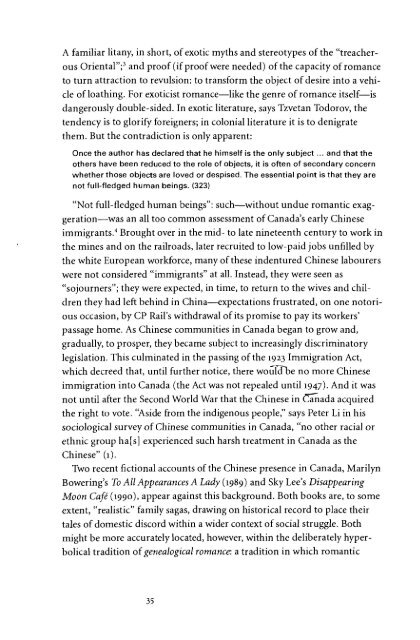To All Appearances A Lady - University of British Columbia
To All Appearances A Lady - University of British Columbia
To All Appearances A Lady - University of British Columbia
You also want an ePaper? Increase the reach of your titles
YUMPU automatically turns print PDFs into web optimized ePapers that Google loves.
A familiar litany, in short, <strong>of</strong> exotic myths and stereotypes <strong>of</strong> the "treacherous<br />
Oriental"; 3 and pro<strong>of</strong> (if pro<strong>of</strong> were needed) <strong>of</strong> the capacity <strong>of</strong> romance<br />
to turn attraction to revulsion: to transform the object <strong>of</strong> desire into a vehicle<br />
<strong>of</strong> loathing. For exoticist romance—like the genre <strong>of</strong> romance itself—is<br />
dangerously double-sided. In exotic literature, says Tzvetan <strong>To</strong>dorov, the<br />
tendency is to glorify foreigners; in colonial literature it is to denigrate<br />
them. But the contradiction is only apparent:<br />
Once the author has declared that he himself is the only subject ... and that the<br />
others have been reduced to the role <strong>of</strong> objects, it is <strong>of</strong>ten <strong>of</strong> secondary concern<br />
whether those objects are loved or despised. The essential point is that they are<br />
not full-fledged human beings. (323)<br />
"Not full-fledged human beings": such—without undue romantic exaggeration—was<br />
an all too common assessment <strong>of</strong> Canada's early Chinese<br />
immigrants. 4 Brought over in the mid- to late nineteenth century to work in<br />
the mines and on the railroads, later recruited to low-paid jobs unfilled by<br />
the white European workforce, many <strong>of</strong> these indentured Chinese labourers<br />
were not considered "immigrants" at all. Instead, they were seen as<br />
"sojourners"; they were expected, in time, to return to the wives and children<br />
they had left behind in China—expectations frustrated, on one notorious<br />
occasion, by CP Rail's withdrawal <strong>of</strong> its promise to pay its workers'<br />
passage home. As Chinese communities in Canada began to grow and,<br />
gradually, to prosper, they became subject to increasingly discriminatory<br />
legislation. This culminated in the passing <strong>of</strong> the 1923 Immigration Act,<br />
which decreed that, until further notice, there woulcTbe no more Chinese<br />
immigration into Canada (the Act was not repealed until 1947). And it was<br />
not until after the Second World War that the Chinese in Canada acquired<br />
the right to vote. "Aside from the indigenous people," says Peter Li in his<br />
sociological survey <strong>of</strong> Chinese communities in Canada, "no other racial or<br />
ethnic group ha[s] experienced such harsh treatment in Canada as the<br />
Chinese" (1).<br />
Two recent fictional accounts <strong>of</strong> the Chinese presence in Canada, Marilyn<br />
Bowering's <strong>To</strong> <strong>All</strong> <strong>Appearances</strong> A <strong>Lady</strong> (1989) and Sky Lee's Disappearing<br />
Moon Café (1990), appear against this background. Both books are, to some<br />
extent, "realistic" family sagas, drawing on historical record to place their<br />
tales <strong>of</strong> domestic discord within a wider context <strong>of</strong> social struggle. Both<br />
might be more accurately located, however, within the deliberately hyperbolical<br />
tradition <strong>of</strong> genealogical romance: a tradition in which romantic<br />
35

















